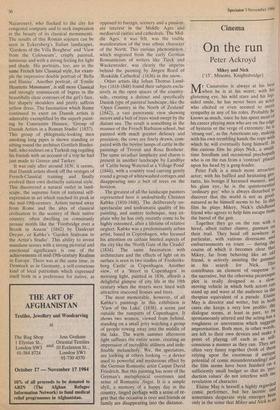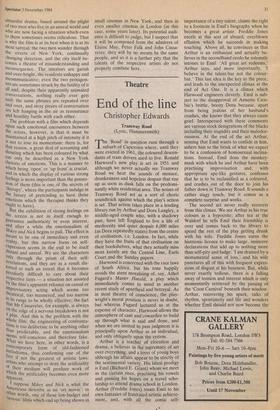Cinema
On the run
Peter Ackroyd
Mikey and Nick ('15', Minema, Knightsbridge)
Mr Cassavetes is always at his best when he is at his worst; with his glistening eye, his wild stare and his lop- sided smile, he has never been an actor who elicited or even seemed to merit sympathy in any of his roles. Probably be knows as much, since he has spent most of his career playing men who are on the edge of hysteria or the verge of extremity: he is 'strung out', as the Americans say, making with his own trembling hands the rope with which he will eventually hang himself. In this curious film he plays Nick, a small- time hoodlum and occasional psychopath who is on the run from a 'contract' placed upon his head by a gang-leader. Peter Falk is a much more attractive actor; with his baffled and hesitating ges; tures, his benign if harassed manner, allu, his glass eye, he is the quintessential 'ordinary guy' who is always disturbed to discover that the world is not as good- natured as he himself seems to be. In this film he plays Mikey, Nick's childhood friend who agrees to help him escape from the barrel of the gun. Together they go on the run with a hired, albeit rather clumsy, gunman on their trail. They head off nowhere rn particular, with various diversions and embarrassments en route — during the course of which it becomes clear that, Mikey, far from behaving like an old friend, is actively assisting the gunman in his search for Nick. This contributes an element of suspense to the narrative, but the otherwise picaresque plot is really designed as a Moil' moving vehicle in which both actors can stand up and wave at the audience in the thespian equivalent of a parade. Elaine May is director and writer, but in both cases she keeps a very low profile: the dialogue seems, at least in part, to be spontaneously uttered and the acting has a roughness or unevenness which suggests improvisation. Both men, in other words, are left to their own devices and make a point of playiqg off each in as self- conscious a manner as they can. They are often very funny together (both of that relying upon the enormous if antique potential of comic misunderstanding) and the film seems have been finished on a sufficiently small budget so that its 'Pro- duction values' do not interfere with the revelation of character. Elaine May is herself a highly regarded, comic performer, but her laconic an sometimes desperate style emerges here only in the sense that Mikey and Nick is an
absurdist drama, based around the plight of two men who live in an unreal world and who are now facing a situation which even to them sometimes seems ridiculous. That is why the film is at its best when it is at its most surreal: the two men wander through the streets of New York, continually changing direction, and the city itself be- comes a theatre of misunderstanding and inconsequence. The interiors are garish and over-bright, the residents unhappy and incommunicative; even the two protagon- ists are sometimes struck by the futility of it all and, despite their apparently animated conversations, nothing really ever gets said: the same phrases are repeated over and over, and stray pieces of conversation are left hanging in the air as reassurance and hostility battle with each other. The problem with a film which depends upon such emotional encounters between the actors, however, is that • it must be maintained at a high pitch of intensity if it is not to lose its momentum: there is, for that reason, a great deal of screaming and shouting which has been coloured by what can only be described as a New York rhetoric of emotions. This is a manner to Which being 'open' or 'up front' is crucial, and in which the display of various strong feelings is more important than the posses- sion of them (this is one of the secrets of `therapy', where the participants indulge in the luxury of pretending to have those emotions which the therapist thinks they ought to have).
But the exhibition of strong feelings on the screen is not in itself enough to guarantee authenticity or even interest, and after a while the emotionalism of Mikey and Nick begins to pall. The effect is meant to be one of immediacy and even reality, but this narrow focus on self- expression seems in the end to be itself distant and unreal. We see the characters Only through the prism of their selP revelations, and they are as a result. dis- torted to such an extent that it becomes Peculiarly difficult to care about their respective fates — a situation not assisted by the film's apparent reliance on casual or Miprovisatory acting which seems too theatrical, too mannered, and too narrow in its range to be wholly effective; the fact that Mr Cassavetes, for example, is always " the edge of a nervous breakdown is not a Plus. And this is the problem with the whole film: the engineering of confronta- tions is too deliberate to be anything other than predictable, and the emotionalism seems self-conscious and therefore fake. What we have here, in other words, is a contemporary form of old-fashioned melodrama, elodrama, thus confirming one of the first if not the greatest of artistic laws: artists who attempt to deny the artificiality of their medium will produce work of which the artificiality becomes even more apparent.
I suppose Mikey and Nick is what the Americans describe as an 'art movie': in other words, one of those low-budget and serious' films which end up being shown in
small cinemas in New York, and then in even smaller cinemas in London (in this case, some years later). Its potential audi- ence is difficult to judge, but I suspect that it will be composed from the admirers of Elaine May, Peter Falk and John Cassa- vetes: they will by no means be the same people, and so it is a further pity that the talents of the respective artists do not properly combine here.











































 Previous page
Previous page